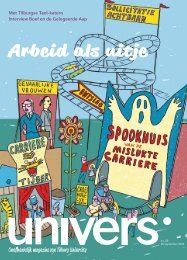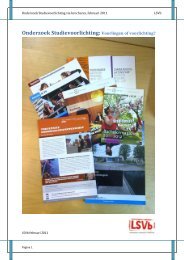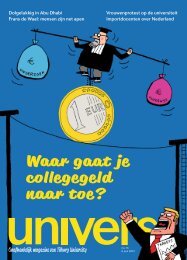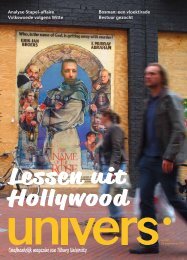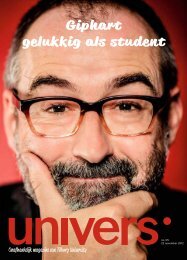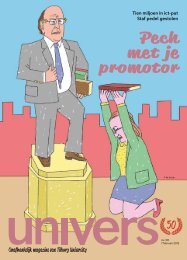Duivelse verleiding - Univers
Duivelse verleiding - Univers
Duivelse verleiding - Univers
Create successful ePaper yourself
Turn your PDF publications into a flip-book with our unique Google optimized e-Paper software.
They don’t contribute<br />
Another problem with international students seems to be that because they<br />
are not well integrated into the society, ‘they do not contribute to the local<br />
economy’, said Sander van den Eijnden in an interview with the Volkskrant.<br />
Van den Eijnden is head of the Dutch organization for internationalization<br />
of higher education (Nuffic). This argument becomes much weaker when<br />
you think about everyday student life. Blommaert says: “They rent rooms,<br />
eat in restaurants, take the bus, go to see movies, buy groceries... What is<br />
contribution to the local economy if this isn’t?” Chinese students don’t only<br />
dine in Chinese restaurants, nor do they rent rooms from Chinese owners.<br />
Thus, the money circulates within the country though the hands of Dutch<br />
owners and companies.<br />
They cost us money<br />
Up until now, European students who work at least eight hours a week can apply for<br />
a grant. For many of them this opportunity, along with the loan, is the main source<br />
of funding their studies. However, the State Secretary Zijlstra plans to increase the<br />
requirement from eight to fourteen hours a week. The argument is that the rules<br />
for Dutch students are getting stricter, so it’s only fair to restrict financial benefits<br />
for foreign students as well. According to the association of Dutch universities<br />
VSNU, such a measure is counterproductive and it will significantly slow the study<br />
pace. Blommaert also disagrees with Zijlstra’s measure. “I myself wouldn’t have been<br />
here if it wasn’t for a system of welfare and higher education subsidies. Changing this<br />
system will result in the exclusion of many excellent students.” The lack of financial<br />
pressure for students is one of the main advantages of studying in the Netherlands.<br />
“If we lose this advantage, we’re shooting ourselves in the foot”, the professor thinks.<br />
For Van Liempd it is a question of a well-defined strategy: “There is a contradiction in<br />
the government’s position. On the one hand Zijlstra sees a potential in China, but on<br />
the other hand they’re making domestic rules stricter for international students. The<br />
government lacks a broad internationalization policy.”<br />
They are ‘normal’ immigrants<br />
Jan Blommaert, himself being a knowledge<br />
migrant, makes a clear distinction between<br />
general immigration figures and the increase<br />
in the number of international students.<br />
“The days of attracting immigrants are<br />
certainly over. Migration to the Netherlands<br />
is effectively discouraged and regulated.”<br />
Nonetheless, so-called smart migration is<br />
increasingly important. It is crucial for the<br />
universities to attract and invest in international<br />
students. “Foreign students shouldn’t<br />
be seen as migrants. The politicians should<br />
approach student mobility as an economic<br />
opportunity, and not as a sociological<br />
nightmare.”<br />
When it’s warmer<br />
than 15 degrees I get<br />
incredibly sweaty<br />
under my armpits<br />
Column<br />
Awkward!<br />
International .25<br />
You walk on campus and you see someone approaching from<br />
the opposite direction. You know that person from student<br />
parties, but in a state of non-intoxication you haven’t a clue<br />
what to talk about. There is this awkward moment in which<br />
you say ‘hi’ and hesitate for a split second whether to stop and<br />
talk or keep on walking. The other person takes advantage of<br />
your indecisiveness and throws in the dreaded ‘what’s up?’.<br />
You have no choice anymore. You have to make small talk.<br />
Here are some tips on how to make the chitchat much less of<br />
a cliché.<br />
When the conversation starts with a statement about the<br />
exceptionally beautiful weather, respond: “It’s not so great for<br />
me. When it’s warmer than 15 degrees I get incredibly sweaty<br />
under my armpits. Look, do you see it?”<br />
When asked about your well-being, list all the things that are<br />
wrong in your life. Complain about your back pain. Complain<br />
about troubles in your relationship. Complain about a broken<br />
toe nail, and don’t forget to describe in detail how much it<br />
hurts. Sharing is caring.<br />
Give a backhanded compliment. Say that you love someone’s<br />
haircut, and that it’s sooo much better than the old one. So<br />
much better. Really.<br />
When asked about your studies, describe in detail the progress<br />
of your thesis. Say what chapter you are working on, which<br />
paragraphs you’ve finished, and which sentences you find<br />
problematic. Don’t forget to list all the sources you’re<br />
us ing. They probably want to know all about it, they’re just<br />
too polite to ask.<br />
When asked about your plans for the summer, say that you<br />
won a trip to the Caribbean in the Albert Heijn contest. You<br />
can’t stress the fact that they pay for the tickets, private bungalow<br />
on a beach, cocktails with paper mini-umbrellas, and a<br />
day with Captain Jack Sparrow, enough.<br />
Note: I shall not be held responsible for your social alienation<br />
and eventual loneliness.<br />
Sonia Kolasinska<br />
is a third-year<br />
Liberal Arts<br />
student.<br />
<strong>Univers</strong><br />
12 april 2012



